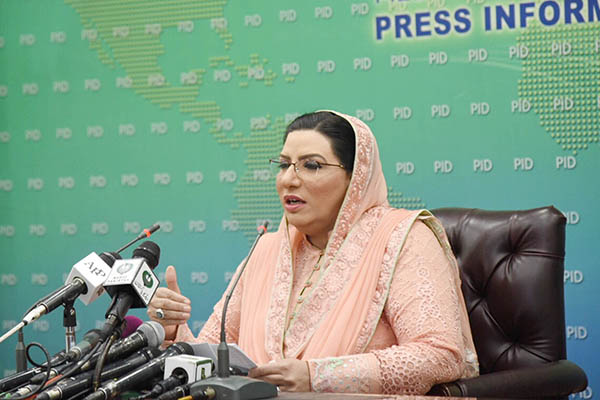
Courtesy PID
In press conference, Special Assistant to the P.M. on Information claims Islamabad will not act against ‘interests of users’
In a bid to defuse rising concern over the new social media policy unveiled by the Pakistan Tehreek-e-Insaf-led government, Special Assistant to the P.M. on Information Firdous Ashiq Awan on Thursday claimed the rules were intended to protect, and not penalize, citizens.
“[Earlier] we lacked any mechanism to protect our citizens’ interests, our national integrity,” she told a press conference in Islamabad. She said that following the enactment of the new policy, social media companies would strive to not hurt Pakistan’s national interests, implying that user-generated content was the purview of the companies and not the individual.
The federal cabinet this week approved a new policy that requires all social media companies wishing to operate in Pakistan to set up registered offices in the federal capital within three months and appoint locals as focal persons. It also requires the companies to disclose any data to a designated investigation agency whenever it is sought without requiring any legal warrant. Any company that fails to disclose private data would be fined up to Rs. 500 million.
In addition, social media companies would be required to remove any content deemed “anti-state” or “unlawful” by a National Coordinator within 24 hours of being informed of it. There is no criteria laid down on what would constitute “illegal” content, with the policy leaving that determination up to a committee.
According to Awan, the new rules would help the government learn who was creating fake accounts that “harm socio-cultural and religious values.” She claimed this would help “expose” Pakistan’s enemies and allow authorities to stop extremists who spread hate on the basis of religion and race.
The special assistant also claimed that social media was spreading disorder in society by propagating pornography, sexual abuse, child abuse, hate speech and sectarian material. “[About] 73 percent of Pakistanis are internet users. Social media users are increasing, especially among youth. We will not take any step that is against their interests,” she claimed, adding that as companies did not have offices in Pakistan currently, they were free to ignore demands from the government to remove “harmful” material. The new law would bring all such companies under the ambit of the Pakistani legal system, she added.
“The companies will have the right to challenge the [National Coordinating] authority’s decision [within 30 days0 if they think it will harm their interests,” said Awan. Per the rules, the forum of appeal would be the relevant high court.
Science and Technology Minister Fawad Chaudhry also sought to defend the new rules, claiming they were designed to regulate advertisements and harmful content on social media. “The keyword here is harmful content,” he said, adding that “social media is used for maligning women, blasphemy and defaming people and anyone on social media knows there are groups that for Rs. 20,000 or 30,000 will run trends against you and defame you.”
He further claimed digital media “had taken the space of formal media” and there has been an exponential increase in digital advertising that required regulation. He said the aim is to hold social media companies answerable within the country’s economic framework. Curiously, nowhere in the new rules is there any mention of advertising or economic concerns. It solely seeks to control the type of content that is shared by users on social media—and seeks full access to the identification anyone using social media.
